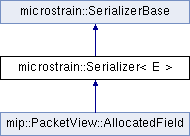Serializes or deserializes data to/from a byte buffer. More...
#include <serializer.hpp>
Inheritance diagram for microstrain::Serializer< E >:

Public Member Functions | |
| template<typename... Ts> | |
| bool | insert (const Ts &... values) |
| Serializes one or more values. More... | |
| template<typename... Ts> | |
| bool | extract (Ts &... values) |
| Deserializes one or more values. More... | |
| template<class T , class S > | |
| bool | extract_count (T &count, S max_count) |
| Deserializes an integer with maximum permissible value. More... | |
| template<class T , class S > | |
| bool | extract_count (T *count, S max_count) |
| SerializerBase ()=default | |
| SerializerBase (uint8_t *ptr, size_t capacity) | |
| SerializerBase (const uint8_t *ptr, size_t size) | |
| SerializerBase (microstrain::ConstU8ArrayView buffer) | |
 Public Member Functions inherited from microstrain::SerializerBase Public Member Functions inherited from microstrain::SerializerBase | |
| SerializerBase ()=default | |
| SerializerBase (uint8_t *ptr, size_t capacity) | |
| SerializerBase (const uint8_t *ptr, size_t size) | |
| SerializerBase (microstrain::ConstU8ArrayView buffer) | |
| uint8_t * | getPointer (size_t required_size) |
| Obtains a pointer to the current offset for reading/writing a value of the specified size. This function does NOT advance the offset value. Generally, you should use getPtrAndAdvance() instead. More... | |
| uint8_t * | getPtrAndAdvance (size_t size) |
| Obtains a pointer to the current offset for reading/writing a value of specified size, and post-increments the offset by that size. Use this function just like pointer(). More... | |
| void | invalidate () |
| Marks the buffer as invalid, i.e. overrun/error state. All further accesses via pointer(), getPtrAndAdvance(), etc. will fail. (basePointer() and capacity() remain valid) More... | |
| size_t | setOffset (size_t offset) |
| Sets a new offset and returns the old value. This can be used to save/restore the current offset. Calling setOffset() after an overrun with an in-range (i.e. non-overrun) value restores the non-overrun status. More... | |
Static Public Attributes | |
| static const serialization::Endian | ENDIAN = E |
Detailed Description
template<serialization::Endian E>
class microstrain::Serializer< E >
Create one of these to handle serialization or deserialization of one or more values to/from a buffer of bytes.
You can use this->insert/extract or directly call the insert/extract non- member functions taking a serializer reference.
The endianness is included as part of the Serializer's type so that it doesn't have to be repeatedly re-specified. It is not included as a runtime parameter for performance reasons (most of the time only a buffer of a known, specific endianness is required).
- Template Parameters
-
E Endianness of the target buffer.
Member Function Documentation
◆ extract_count()
template<serialization::Endian E>
template<class T , class S >
|
inline |
◆ SerializerBase() [1/4]
template<serialization::Endian E>
|
default |
◆ SerializerBase() [2/4]
template<serialization::Endian E>
|
inline |
◆ SerializerBase() [3/4]
template<serialization::Endian E>
|
inline |
◆ SerializerBase() [4/4]
template<serialization::Endian E>
|
inline |
Member Data Documentation
◆ ENDIAN
template<serialization::Endian E>
|
static |
The documentation for this class was generated from the following file:
- src/cpp/microstrain/serialization/serializer.hpp
 1.8.17
1.8.17